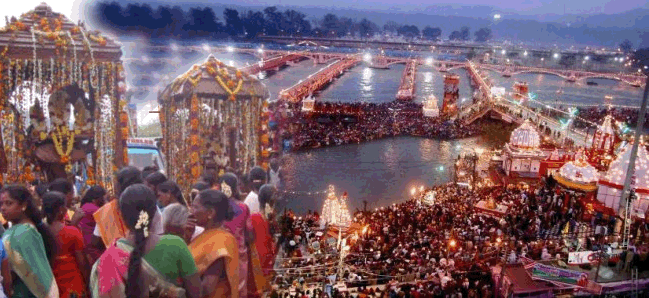|
|

|
|


Makara Sankranti is celebrated in the month of Magh (January-February) and is a harvest festival. It is a celebration of spring on the occasion of the 'ascent' of the sun to the north (Uttarayana). In Maharashtra, Karnataka as well as parts of Andhra, Makara Sankranti is a day of good will and friendship. People exchange pieces of sugar-cane, molasses, pieces of dry coconut, peanuts and fried gram as a symbol of the need to be generous and kind to everyone.
Cows and bulls are washed, their horns painted in bright colours and garlands hung round their necks after which they are taken out in a procession to the accompaniment of pipes and drums. A bonfire is lit at night over which the animals are made to jump.
In the north, during makara sankranti
it is
considered particularly auspicious to bathe at the confluence of the
rivers Ganga and Jamuna in Allahabad, known as Prayag and also in Ganga
Sagar where the Ganga river confluences with the Bay of Bengal. The festival starts with bathing in the ponds or rivers and offering water to
the Sun God (Surya) and giving alms to the poor. Bhojya daan
(charity of raw food) to the Brahmin is customary on this day. The Bhojya daan consists of
an uncooked mixture of rice, dal (lentil) ghee - melted butter, cooking oil, salt and
Til (sesame seeds) ke Laddoo
- a sweet preparation. The Bhojya is first dedicated to Lord Vishnu
and Surya and then is offered to the poor. Such deeds earn special and
lasting merit and assure one a place in heaven, so goes the belief.
Women wear new clothes, new glass
bangles and hold get-togethers to share sweets and gifts. A new bride is given
ornaments made of sugar drops and her new relatives are invited to meet and
welcome her at a Haldi (Turmeric) - Kumkum (Red Vermillion Powder) celebration.
Melas (fairs) on Makar Sankrant day are held in different places, usually near temples or water sources. In many cities of north India kite-flying competitions are held on this day near riverbanks, ponds and in big fields. In Tamil nadu, Makara Sankranti is celebrated as Pongal and in Punjab as Lohri.
More Festivals in January-All over India |
|
|
|
Festivals - All over India |
|